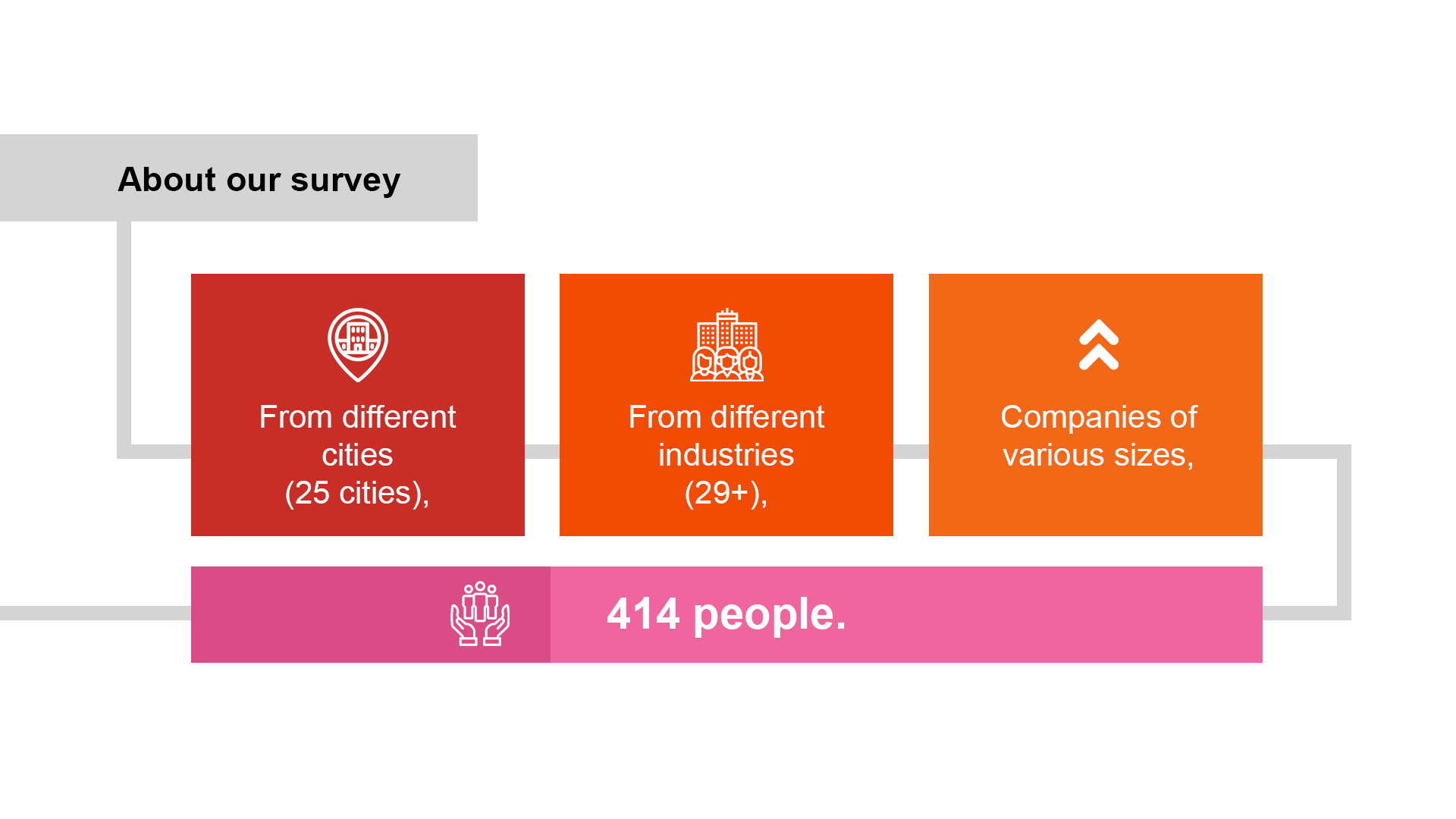
Hopes & Fears : Future of Work
Changes such as rapid technological developments, the onset of pandemic, climate change and the ambiguity and uncertainty about the future of business create increasing numbers of burdens. Amidst uncertainties, it is a priority for companies to develop the new skills required by the new work models, to understand how employees feel and to develop appropriate strategies.
The Hopes and Fears Survey sheds light on future expectations and fears and opinions on the current work life model and its future. Our survey reached 414 people from various cities, age groups, industries and companies in Turkey. Participants contributed to this comprehensive report on work life in Turkey by answering questions about the future of work life, its impact on individuals, their expectations and the competencies of the future.
While participants of the survey are obviously worried about the future of the business world, most participants stress that personal brands will become more important in recruitment in the future, replacing the traditional recruitment model. According to the participants, technology provides more opportunities than risks, and the workforce in Turkey took necessary actions quickly and effectively when it came to developing digital skills.

“Employees feel more concerned about the future of the business world and its impact on future generations”
Takeaways
- 42% of the participants are worried about the future of their occupation. Globally this rate is 50%.
- 59% feel worried about the future of work and its impact on future generations.
- While 49% of women are worried about being personally affected by the future of the business world, only 36% of men share this concern. Regarding the impact of the business world on future generations, women are more concerned than men.
- 64% believe the traditional recruitment model will become obsolete and that people will have personal brands under which they will sell their skills on a short-term basis to companies/institutions who need them. Globally, 48% share this belief.
- 51% believe very few people will have stable, long-term employment in the future. Globally, 56% share this belief.
Technological developments are more and more integrated in our lives and the business world. Consequently, while new jobs emerge, current ones change, and change causes uncertainty, excitement and worry. While participants in Turkey feel very worried about the future of their jobs, global participants feel excited and confident. Also, women seem more worried about themselves and future generations than men do.
Participants from Turkey believe that the recruitment model will change, people will sell their skills under their own brands and very few people will have stable, long-term jobs. Because of the highly competitive Turkish labour market, the increase of gig jobs and the inclination of Gen Z towards social media and freelance work, participants’ trust in and expectations of personal brands are higher than the global averages.
Question: How do you feel about the future of the business world and its impact on you?
“Technological developments will present opportunities”
“Employees want a hybrid work model and the freedom to take initiative”
Takeaways
- 87% of participants want a hybrid work model. Globally, 72% share this belief.
- While 65% of participants state that they want a work environment where they can make a difference or take more initiative, only 14% state that they Take opportunities to maximise their income.
- While 38% of participants in the 18-35 age group say that being able to control their job and decide what they do and when will become important in the future, only 14% say theyTake every opportunity to maximise their income. While work security and working long term in an organisation ranked 3rd in all three groups, the 18-35 age group chose it the least (16%).
The COVID-19 pandemic caused radical changes in the business world. As company priorities, operation models and work models change, issues such as work-life balance and doing a job that is meaningful become more important, and well-being claims an important position in company strategies and on company agendas. When we categorise the participants by age, we come across differing results. Participants in the 18-35 age group want to control their own jobs, while the 35-54 age group wants jobs that make a difference. Results show that the 18-35 age group selected work security and long-term work in an organisation less than other age groups.
Much research suggests that the remote work model, which became widespread with the impact of the pandemic, affects women and men differently because of the unbalanced division of household labour. Survey results suggest that more women than men prefer fully remote working conditions.
“Employees want to upskill”
Takeaways
- 89% state that they are ready to upskill or reskill to be able to keep working in the future. Globally, 77% share this belief.
- More than 60% of participants believe that digital skills, creativity and innovation and being able to quickly learn new skills and adapt will become more important in the future.
- Globally, 74% of the participants believe that upskilling is their own responsibility. In Turkey, 63% share this belief.
- 48% of participants say they developed their digital skills during the pandemic. Globally, 40% share this belief.
Because of technological developments, new ways of working and the pandemic, the skills employees need in their work changed. To catch up with these developments and achieve competency, employees used various strategies. Accordingly, another prominent finding of the survey is that employees in Turkey expect less from public authorities compared to the global average.
Employees in Turkey took important steps to learn these skills and prepare themselves for the new conditions. 89% of participants state that they are ready to learn these skills. This percentage is very high compared to global results. When compared to global results, employees in Turkey expect less from public authorities with regard to skill development.









